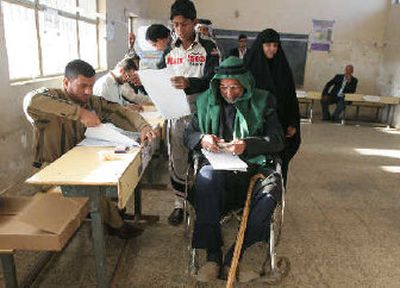Iraqis vote in huge numbers

BAGHDAD, Iraq – Millions of Iraqis, from tribal sheiks to entire families with children in tow, turned out Thursday to choose a parliament in a mostly peaceful election – among the freest ever in the Arab world.
So many Sunni Arabs voted that ballots ran out in some places. The strong participation by Sunnis, the backbone of the insurgency, bolstered U.S. hopes that the election could produce a broad-based government capable of ending the daily suicide attacks and other violence that have ravaged the country since the fall of Saddam Hussein.
Difficult times lie ahead, however. The coalition of religious Shiite parties that dominates the current government is expected to win the biggest portion of the 275 seats, but will almost certainly need to compromise with rival factions, with widely differing views, to form a government.
Up to 11 million of the nation’s 15 million registered voters took part, election officials estimated, which would put overall turnout at more than 70 percent.
Many Sunnis said they voted to register their opposition to the Shiite-led government and to speed the end of the U.S. military presence.
“Liberation is the most important thing for all Iraqis,” said Sunni grocer Omar Badry. “I don’t care if we die of thirst and hunger, as long as the Americans leave.”
Opposition to the American military presence runs deeper among Sunni Arabs, the minority group which enjoyed a privileged position under Saddam, than among any of Iraq’s other religious and ethnic communities.
While Sunnis were defiant, Shiites and Kurds seemed hopeful the new government would be more successful than the outgoing one in restoring security.
A common theme, however, appeared to be a yearning for an end to the turmoil that has engulfed Iraq since the U.S.-led coalition invaded in March 2003 to topple Saddam’s regime.
“The first thing we want from the new government is security,” said Hussein Ali Abbas, a 66-year-old Shiite as he voted at Baghdad’s city hall. “We are surviving but it is a struggle.”
Officials said it could take at least two weeks until final results are announced for the parliament, which will serve a four-year term.
Violence was light. Insurgent groups, as promised, generally refrained from attacks on polling stations. In the Sunni Arab militant stronghold of Ramadi, masked gunmen provided by local sheiks guarded polling stations, frisking voters as they entered.
Thursday’s election appeared on track to record more votes than any other parliamentary election in an Arab country – though more than 17 million people voted in a May referendum in Egypt, and more than 14.6 million in a September referendum in Algeria, according to IFES, a nonprofit organization that supports building democratic societies.
“The number of people participating is very, very high, and we have had very few irregularities,” U.S. Ambassador Zalmay Khalilzad told the Associated Press. “It is a good day so far – good for us, good for Iraq.”
President Bush called it “a major step forward in achieving our objective.” U.S. officials hope a broad-based government will be able to quell the bloodshed so that the United States can begin to bring troops home next year.
A successful election followed by an effective, broad-based government would also give the Bush administration a significant victory in its campaign to spread democracy through the Middle East. But many Shiite politicians have little interest in concessions to Sunnis on their key demands, including a greater share of power and allowing a role for Saddam loyalists in public life.
As a result, negotiations to create a new government – including a prime minister – could drag on for weeks just as they did following January’s election, when many Sunnis stayed away from the polls because of threats of violence or to honor boycott calls. Another prolonged political struggle might worsen sectarian tensions.
Still, Iraqi leaders expressed relief that the election had passed relatively smoothly.
“The time has come to build Iraq with our own hands and to use the great wealth that God has granted to Iraq to rebuild Iraq so that we can turn our poverty into wealth and our misery into happiness,” Prime Minister Ibrahim al-Jaafari said.
U.S. officials saw the lack of violence as an encouraging sign.
“We should expect the insurgency not to just go away, but to gradually reduce,” said Gen. George Casey, top U.S. commander in Iraq, speaking via video to a town hall-style meeting of Defense Department workers at the Pentagon.
Defense Secretary Donald Rumsfeld added, “This election constitutes a defeat for the enemies of the Iraqi people, the enemies of the legitimate Iraqi government. It constitutes a defeat to the people who have been doing the beheadings and conducting the suicide raids.”
As polls opened, a mortar shell exploded near Baghdad’s heavily fortified Green Zone, slightly wounding two civilians and a U.S. Marine, the U.S. military said.
In northern Iraq, a civilian was killed when a mortar shell hit near a polling station in Tal Afar, and a grenade killed a school guard near a voting site in Mosul.
But the incidents did little to discourage Iraqis, some of whom turned out wrapped in their flag on a bright, sunny day. Afterward, many displayed a purple ink-stained index finger – a mark to guard against multiple voting.